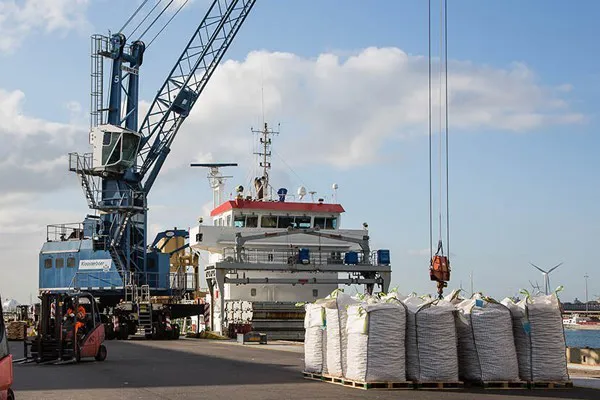DEFRA’s decision not to extend the derogation which allowed the continued import of seed potatoes from Europe while British growers were banned by from exporting seed to the EU has been widely welcomed by the industry.
Britain exported around 30,000 tonnes of seed potatoes, worth £13.5 million, to mainland Europe each year and the majority of these were high-health stocks grown in Scotland.
When the UK left the EU the UK government granted a six-month extension on the import of EU seed potatoes, this extension expired on 30 June 2021. The UK Government has previously applied for equivalence on seed potatoes, and this application has been rejected. The National Farmer’s Union Scotland hopes the decision taken by the UK Government not to extend authorisation to EU seed imports will bring fresh impetus to talks that will agree equivalence and allow Scottish seed potato exports to resume.

Loading of seed potatoes. Photo NAO
Chair of NFU Scotland’s Potatoes Working Group, Mike Wilson said: “We are delighted that the principle of seed potato trade between the EU and GB having to go ‘both ways or no-ways’ has been upheld by Defra.
“Extending the authorisation for a further six months had the potential to devastate Scotland’s seed potato industry, impacting many of our members’ businesses and Scotland’s rural economy. We welcome that the UK Government’s allowance for EU seed potatoes to be sold to GB has now officially been ended.
“This means that potato growers throughout Britain will have to source their seed from within Britain, which is good news for Scotland’s seed potato sector. The GB market is quite different from the EU market, so the potato sector has quite a task on its hands to develop and supply this internal market.
“In the meantime, NFUS will be working with Government and our European counterparts to regain access to the EU market. This will not be an easy task as the EU Commission has made it very clear on several occasions that the seed potato trade is a casualty of Brexit.”
Robert Doig Director of Caledonian Potatoes who has just been elected to the council of the BPTA (British Potato Trade Association) who has called for a level playing field right from the start of the ban on seed exports to Europe, has also welcomed DEFRA’s decision.
“In Scotland we have the varieties to replace those from Europe, if we have the volumes remains to be seen. Many European seed exporters have operations over here so you would hope they have had the foresight over the last five years to plan for this situation.
“While the import of seed has been stopped, approved stock can still be imported for trials and development purposes only, this is reciprocal. What we also need is a reciprocal mini-tuber protocol, this should be relatively easy as the pathogens which we would worry about are soil borne and so are not relevant in this case.”
"As a result of this decision, an annual export of 15,000 to 20,000 tons of seed potatoes from the Netherlands to the UK has disappeared, accounting for about 5% of the volume that the Netherlands exports to European countries," says Jan Gottschall Secretary of the Netherlands Potato Organization (NAO).
"It is quite a dramatic situation. You simply want to be able to provide your customers worldwide with high-quality seed potatoes, including in the United Kingdom. Several Dutch companies also have locations in the United Kingdom and they are also affected by this. Certain varieties were grown there annually to be further multiplied in the Netherlands. This can no longer happen," says Jan.
"The British have always said that if the European Union does not provide market access for the seed potatoes, they would also close the borders on 1 July. All in all, it is not unexpected, but very unwelcome. Our position has always been to fight for mutual market access. There have been intensive relations between the Dutch and Scottish seed potato sector in particular for decades. Free trade between the UK and the EU is of great importance," notes Jan.
The NAO has a strong lobby to undo the trade barrier. "Given the mutual annual export figures, there is a need on both sides to get this ban off the road again as soon as possible. We are in contact with our European organizations, the Ministry of Agriculture, Nature and Food Quality and the NVWA about this and also with the British organizations. they are working hard on it, but the prospects are still bad at the moment.”
For more information:
Mike Wilson
NFUS
Tel: +44 131 472 4000
[email protected]
www.nfus.org.uk
Robert Doig
Caledonia Potatoes
Tel: +441738 446 723
[email protected]
Jan Gottschall
Dutch Potato Organization
Tel: +31 070 3589331
[email protected]
www.nao.nl
